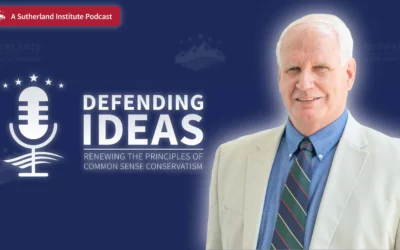
Written by William C. Duncan
July 13, 2023

The Sierra Club, founded in 1892, describes its founder, John Muir, as “America’s most famous and influential naturalist and conservationist.” Muir was instrumental in promoting national monuments and national parks that continue to preserve wilderness areas in the United States. “His writings contributed greatly to the creation of Yosemite, Sequoia, Mount Rainier, Petrified Forest, and Grand Canyon National Parks.” Documentary film maker, Ken Burns, places him among “the pantheon of the highest individuals in our country … people who have had a transformational effect on who we are.”
Muir was also a deeply spiritual person. The exact nature of his religious beliefs is contested and complicated by a challenging relationship with a severely religious father. But following a period of temporary blindness, one author says Muir “experienced something of a conversion as his sight slowly returned.” Muir himself said later:
As soon as I got out into Heaven’s light I started on another long excursion, making haste with all my heart to store my mind with the Lord’s beauty and thus be ready to any fate, light or dark. And it was from this time that my long continuous wanderings may be said to have fairly commenced. I bade adieu to all my mechanical inventions, determined to devote the rest of my life to the study of the inventions of God.
Religious faith can be a powerful motivation for efforts to protect the environment.
In 2015, Pope Francis issued an encyclical letter, Laudato Si’, with the subtitle “On Care for Our Common Home.” The letter decries the harm we “have inflicted on her [the Earth] by our irresponsible use and abuse of the goods with which God has endowed her. We have come to see ourselves as her lords and masters, entitled to plunder her at will.” He warns of pollution, waste and a “throwaway culture.” While recognizing that specific solutions will arise in “honest debate,” he urged readers to “take a frank look at the facts to see that our common home is falling into serious disrepair.”
As John Muir demonstrated, religious and spiritual concerns about caring stewardship of our physical environment can produce effective action as well.
A recent example comes from close to home. Responding to the drying of the Great Salt Lake with the potential implications of “increased dust, poor air quality, reduced snow, reduced lake access, [and] habitat loss,” The Church of Jesus Christ of Latter-day Saints in March of this year donated thousands of water shares to state of Utah. The donation “is equivalent to over 20,000 acre-feet … and up to 50 cubic feet per second of water. … The 20,000 acre-feet donated are equivalent to a water supply for 20,000 single-family homes.” The “water will continue to flow to the lake and preserve critical shoreline and wetland habitat in Farmington Bay.”
In addition:
On its farms the faith uses soil moisture probes to inform irrigation decisions. They are also developing water management plans for all the Church’s agricultural properties. And at its meetinghouses, temples and other facilities, the Church has installed smart controllers, hydrometers, rain sensors and drip irrigation systems.
This, and similar practices, have resulted in saving millions of gallons of water.
Other faith groups are working to preserve lands they consider sacred. Ongoing litigation is seeking to prevent mining in Oak Flat, Arizona that Apache peoples have used for religious ceremonies for generations.
The precise beliefs and commitments of various faiths and individuals differ. However, the outcomes they seek have the potential to benefit not only adherents of a particular faith, but everyone who would be impacted by environmental degradation. Anyone concerned about the environment, whatever their political or religious beliefs, should surely welcome the efforts and dedication of those motivated by faith.
Many environmental efforts, understandably, involve government regulations. Faith-based efforts, however, add a different dimension of voluntary, sometimes sacrificial dedication to fulfill a sense of sacred stewardship for the Earth and its resources. Religious teachings can motivate people who might not be aware of or know how to preserve the natural environment to take steps that will reduce waste, pollution and the exhaustion of natural resources.
As in other areas, the ability of religious groups and people of faith to practice their religion benefits not only those protected, but the society in which these groups and people contribute. By exercising their religious beliefs, individuals and organized religion help alleviate problems that affect everyone.

Insights: analysis, research, and informed commentary from Sutherland experts. For elected officials and public policy professionals.

- Religious belief can be a powerful motivation to care for our physical environment.
- The teachings and practices of religious groups are an important source of protection for the environment.
- Preserving the independence of people of faith and religious organizations allows them to make unique contributions to environmental conservation that would be unlikely if left to business, politics and government.
Read More
Protecting property rights against government overreach
While governments can continue to regulate land use, these regulations and fees must be justified by a government interest and proportional to the effect of the development’s impact on that interest.
Do we need to care about the Utah State Board of Education?
For any Utah voters who also feel like K-12 public education is headed in the wrong direction, learning about the candidates running for a seat on the Utah State Board of Education (USBE) is a wise choice this election season.
Defending education choice the right way
Education choice has exploded in popularity across the nation in recent years. So why does it remain a contentious point of debate in some parts of the country?


